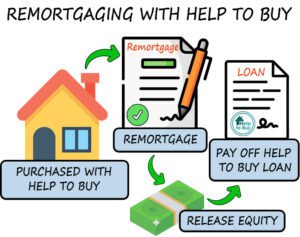Are you a first-time homeowner in the UK who took advantage of the Help to Buy scheme? If that is the case, and you wish to repay your equity loan quickly and efficiently, this guide provides simple yet straightforward information that will assist in that process.
Understanding Your Equity Loan
Help to Buy equity loans can quickly become very restrictive to some borrowers. When you want to remortgage, any money raised has to be used to repay your equity loan and not towards making improvements on your home or consolidating debt. For this reason, many borrowers want to get rid of their help to buy equity loan as quickly as possible.
Before beginning repayment of an equity loan or mortgage, it’s crucial that you understand its implications. Seek independent financial advice so you make the right choice for yourself and your circumstances.
Keep Up with Your Payments
While making plans to repay a help to buy loan, you must continue paying your management fee and monthly interest charges on time or through an approved payment plan. Any outstanding payments must be settled either fully or with an acceptable repayment plan before any changes can be made to it.
How Much Do You Need to Repay?
Your monthly mortgage repayment amount is determined based on the current market value of your home at the time you decide to repay, which can be obtained via the Royal Institution of Chartered Surveyors valuation. Your payment includes interest and any outstanding arrears payments which need clearing up.
Example: Assuming your home has an initial market value of £200,000 and you take out a 20% equity loan worth £40,000, should the value rise above £250,000 you owe back 20% or £50,000 of its new value owed on time.
How to repay help to buy
Repaying your Help to Buy loan can be achieved in various ways. Remortgaging may be one option; alternatively, if you have enough personal funds saved through inheritance or savings accounts to use these to repay it – read on for an in-depth look into these methods and a real-life example!

1) Remortgage to repay help to buy equity loan
Remortgaging your home can be a successful strategy for repaying a Help to Buy equity loan. Whatever your situation, knowing how to remortgage is always important. Remortgaging involves replacing your existing mortgage with one from either your existing mortgage lender or a different mortgage lender. The new mortgage can cover more than what was owed on the previous one, with any extra funds going toward paying back your equity loan. Remortgaging could also prove advantageous if the value of your property has significantly appreciated since purchase or if enough equity exists within it to cover its repayment.
Example: If your mortgage debt totals £100,000. but the property’s market value stands at £250,000, refinancing for just £150,000 might make more financial sense and apply that extra amount toward repaying the Help to Buy equity loan balance.
Remortgaging could incur fees and may extend the term of your mortgage loan; as a result, it’s wise to seek independent financial advice prior to making this decision. For more details on remortgaging a Help to Buy equity loan please see our comprehensive guide on How to Remortgage with Help To Buy.


2) Repay help to buy using your own money
Have you come into some inheritance or maybe you have been saving up funds? A great way of paying off your equity loan is to do so with your own funds.
Below is the process to repay all or part of your Help to Buy: Equity Loan, using your own money or other private funds.


Case Study: Sarah's Inheritance Boost
Recently, Sarah received a £50,000 inheritance. With the five-year interest-free period on her equity loan ending soon, she decided to use her windfall to pay off this loan. After clearing the equity loan, her home was completely hers and the mortgage lender's.
With £10,000 left from her inheritance, Sarah decided to remortgage with a new lender that allows overpayments. She found a lender with attractive rates and used the leftover inheritance to reduce her new mortgage balance.
This case study shows how a financial windfall can speed up the journey to being mortgage-free, if used wisely.
Steps to Repay Your Equity Loan
1. Get a Surveyor’s Valuation Report
Before you can repay your equity loan, you need to get an RICS valuation report for your property. However, before you contact a surveyor, you must inform the Help to Buy Customer Service team about any factors that may affect the value of your home, as they may need to agree on which RICS surveyor you can use. To pay off your equity loan, you need a property valuation report from an RICS surveyor. Here are the key steps:
- Contact Help to Buy Service: Before contacting a surveyor, tell the Help to Buy Customer Service team about anything that could affect your home’s value, like external cladding or breaches of planning permission.
- Choose a Qualified Surveyor: You need a surveyor who is RICS-qualified and independent. They should inspect the inside of your home and provide information on similar properties nearby. You can find a RICS surveyor in your area here.
- Send Your Report: After receiving your report, send it to [email protected] within 5 days. The report must be in PDF format and addressed to Homes England on the surveyor’s official letterhead.
- Use Report Within 3 Months: The report is valid for 3 months. If you can’t repay your loan within this time, you can extend the report for another 3 months with a ‘desktop valuation’ from the same surveyor.
- In Case of Disputes: If the Help to Buy team rejects your report, you’ll need a new one. If you disagree with the new valuation, an RICS-appointed surveyor will make a final valuation.
Remember, any report that doesn’t meet these criteria or is for bank or mortgage purposes won’t be accepted by the Help to Buy team.
2. Confirm Your Source of Funds
If you’re planning to use your own money, like inheritance or savings, to repay your equity loan, you need to:
- Confirm where this has come from. For example, a copy of a bank statement showing the money.
- Ensure you have the money available to repay any fees, charges, or outstanding missed payments (arrears).
3. Decide the Percentage of Your Equity Loan You’re Repaying
When deciding the percentage of your equity loan to repay, remember that:
- You can repay all or some of your equity loan at any time.
- Make payments equaling at least 10% of the full repayment amount based on what your home is worth at that time, to reduce what you owe.
4. Find a Conveyancing Solicitor
You must instruct a solicitor to carry out the various legal processes that are required.
To find a conveyancing solicitor:
- You can search on the Law Society’s website.
- Alternatively, speak with your broker and ask who they would recommend.
5. Pay the Administration Fee and Any Arrears
When you apply to repay your equity loan:
- You’ll need to pay an administration fee of £200.
- You’ll also have to clear any arrears or outstanding payments.
- If you cannot clear your arrears, you may be able to continue to apply if you agree to a payment plan or clear the arrears at the same time you repay your equity loan.
6. Complete the Repayment Application Form
Download and complete the Help to Buy Equity Loan Repayment Application Form here and return, it with your evidence documents showing where your money is coming from.
To complete the repayment application form:
- Fill out and return the equity loan repayment application form.
- Include your evidence documents showing where your money is coming from.
- Provide your solicitor’s contact details and give the solicitor authority to act on your behalf.
7. Receive a Redemption Letter
To receive a redemption letter:
- Send the RICS valuation report.
- Submit your completed application form.
- Pay the administration fee and any arrears.
After these steps, you’ll receive a redemption (repayment) letter. This letter will confirm that you can repay your equity loan, the percentage of the equity loan you took out, and how much your repayment amount will be, based on the valuation report.
Legal Undertaking Agreement
Your solicitor will receive a list of items they need to put into a ‘legal undertaking’. This is a legal agreement formalised in paperwork. If the completion date on the undertaking is delayed by more than a week, a new repayment amount and undertaking may need to be supplied.
Repaying Your Equity Loan
Once all the above steps are completed, you can repay all or part of your equity loan and complete the repayment process. Your conveyancing solicitor transfers the funds to repay your equity loan. The total amount will include any interest, charges, administration fees, and arrears that you owe.
Completing the Process
- Your conveyancing solicitor transfers funds to repay your equity loan in full. This amount includes interest, charges, administration fees and any arrears due from you.
- Your solicitor provides all necessary completion documents.
- As soon as the Help To Buy Scheme receives funds, they check that their total is the same amount listed on your Authority to Complete form, informing both you and your solicitor of this development.
- Your solicitor will certify this, issuing you with a “completion statement”.
- Once it has been verified that all payments have been completed on an equity loan, we will apply to the Land Registry to remove their charge on your property and release you from its obligation.
FAQs
How do you repay Help to Buy?
You can repay your Help to Buy loan by remortgaging your home, selling your home, or using personal or other private funds. The process involves getting an RICS valuation report, confirming your source of funds, deciding the percentage of your equity loan you're repaying, finding a conveyancing solicitor, and completing the repayment application form.
Can I pay off my Help to Buy loan early?
Yes, you can pay off your Help to Buy loan early. You can repay all or part of your equity loan at any time, with part payments being at least 10% of the total value of your home at the time of repayment.
Is it worth paying off Help to Buy early?
Determining whether it is worth paying off your Help to Buy loan early depends on your individual circumstances and should take into account penalties, other debts, and overall financial considerations before making this decision.
How do I pay off Help to Buy before 5 years?
You can pay off your Help to Buy loan before 5 years by remortgaging, selling your home, or using personal or other private funds. You'll need to follow the repayment process, which includes getting an RICS valuation report and completing the repayment application form.
How much do you have to repay Help to Buy?
The amount you need to repay for your Help to Buy loan is based on the market value of your home at the time you choose to repay, not the original price you paid. This is determined by an RICS valuation. The repayment amount includes interest, fees, and any outstanding payments or arrears.
Do I need a solicitor to repay Help to Buy?
Yes, you need a conveyancing solicitor to repay your Help to Buy loan. The solicitor will handle the legal processes involved in the repayment, including the completion of necessary documents and the transfer of funds to repay your equity loan.


